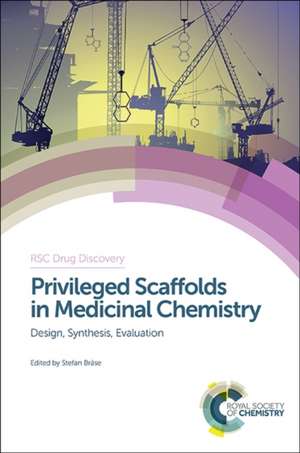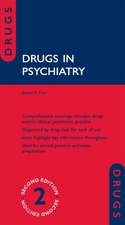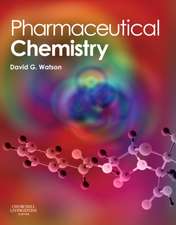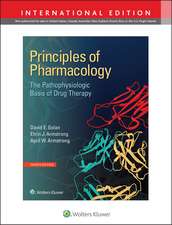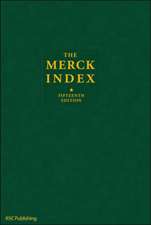Privileged Scaffolds in Medicinal Chemistry: RSC Drug Discovery, cartea 50
Editat de Stefan Brase Contribuţii de Roland Pfau, Encinas, Arantxaen Limba Engleză Hardback – 19 noi 2015
Din seria RSC Drug Discovery
- 14%
 Preț: 1227.21 lei
Preț: 1227.21 lei - 27%
 Preț: 2320.97 lei
Preț: 2320.97 lei - 5%
 Preț: 1548.26 lei
Preț: 1548.26 lei - 5%
 Preț: 1146.35 lei
Preț: 1146.35 lei - 5%
 Preț: 1137.19 lei
Preț: 1137.19 lei - 14%
 Preț: 1028.99 lei
Preț: 1028.99 lei - 5%
 Preț: 1139.05 lei
Preț: 1139.05 lei - 14%
 Preț: 1080.91 lei
Preț: 1080.91 lei - 14%
 Preț: 1195.25 lei
Preț: 1195.25 lei - 14%
 Preț: 1137.86 lei
Preț: 1137.86 lei - 5%
 Preț: 1372.96 lei
Preț: 1372.96 lei - 14%
 Preț: 1247.24 lei
Preț: 1247.24 lei - 9%
 Preț: 1067.06 lei
Preț: 1067.06 lei - 14%
 Preț: 1040.85 lei
Preț: 1040.85 lei - 14%
 Preț: 1163.73 lei
Preț: 1163.73 lei - 14%
 Preț: 1247.53 lei
Preț: 1247.53 lei - 5%
 Preț: 1554.98 lei
Preț: 1554.98 lei - 14%
 Preț: 1359.11 lei
Preț: 1359.11 lei - 5%
 Preț: 1529.80 lei
Preț: 1529.80 lei - 14%
 Preț: 1381.56 lei
Preț: 1381.56 lei - 5%
 Preț: 1440.92 lei
Preț: 1440.92 lei - 5%
 Preț: 1138.48 lei
Preț: 1138.48 lei - 14%
 Preț: 1383.21 lei
Preț: 1383.21 lei - 14%
 Preț: 1389.84 lei
Preț: 1389.84 lei - 14%
 Preț: 1321.37 lei
Preț: 1321.37 lei - 5%
 Preț: 1497.68 lei
Preț: 1497.68 lei - 14%
 Preț: 1033.62 lei
Preț: 1033.62 lei - 14%
 Preț: 1134.26 lei
Preț: 1134.26 lei - 5%
 Preț: 1240.14 lei
Preț: 1240.14 lei - 5%
 Preț: 1239.41 lei
Preț: 1239.41 lei - 14%
 Preț: 947.56 lei
Preț: 947.56 lei - 14%
 Preț: 777.54 lei
Preț: 777.54 lei - 14%
 Preț: 1136.40 lei
Preț: 1136.40 lei - 14%
 Preț: 1241.40 lei
Preț: 1241.40 lei - 5%
 Preț: 1499.54 lei
Preț: 1499.54 lei - 5%
 Preț: 886.60 lei
Preț: 886.60 lei - 5%
 Preț: 964.67 lei
Preț: 964.67 lei - 5%
 Preț: 1052.39 lei
Preț: 1052.39 lei - 9%
 Preț: 1006.30 lei
Preț: 1006.30 lei - 9%
 Preț: 1068.32 lei
Preț: 1068.32 lei - 9%
 Preț: 764.05 lei
Preț: 764.05 lei - 9%
 Preț: 1110.77 lei
Preț: 1110.77 lei - 5%
 Preț: 1160.16 lei
Preț: 1160.16 lei - 5%
 Preț: 1157.56 lei
Preț: 1157.56 lei - 5%
 Preț: 1158.06 lei
Preț: 1158.06 lei - 5%
 Preț: 1157.11 lei
Preț: 1157.11 lei - 9%
 Preț: 1211.71 lei
Preț: 1211.71 lei - 5%
 Preț: 1120.12 lei
Preț: 1120.12 lei
Preț: 1535.29 lei
Preț vechi: 1616.10 lei
-5% Nou
Puncte Express: 2303
Preț estimativ în valută:
293.85€ • 305.62$ • 246.25£
293.85€ • 305.62$ • 246.25£
Carte disponibilă
Livrare economică 20 februarie-06 martie
Preluare comenzi: 021 569.72.76
Specificații
ISBN-13: 9781782620303
ISBN-10: 1782620303
Pagini: 486
Ilustrații: NO
Dimensiuni: 163 x 239 x 30 mm
Greutate: 0.86 kg
Editura: Royal Society Of Chemistry
Seria RSC Drug Discovery
ISBN-10: 1782620303
Pagini: 486
Ilustrații: NO
Dimensiuni: 163 x 239 x 30 mm
Greutate: 0.86 kg
Editura: Royal Society Of Chemistry
Seria RSC Drug Discovery
Textul de pe ultima copertă
One strategy to expedite the discovery of new drugs, a process that is somewhat slow and serendipitous, is the identification and use of privileged scaffolds. This book covers the history of the discovery and use of privileged scaffolds and addresses the various classes of these important molecular fragments.
The first of the benzodiazepines, a class of drugs that is powerful for treating anxiety, may not have been discovered had it not been for a chance experiment on the contents of a discarded flask found during a lab clean-up. Some years later, scientists discovered that benzodiazepine derivatives were also effective in treating other diseases. This class of molecules was the first to be described as privileged in the sense that it is especially effective at altering the course of disease. Other privileged molecular structures have since been discovered, and since these compounds are so effective at interacting with numerous classes of proteins, they may be an effective starting point to look for new drugs against the supposedly undruggable proteins.
Following introductory chapters presenting an overview, a historical perspective and the theoretical background and findings, main chapters describe the structure of privileged structures in turn and discuss major drug classes associated with them and their syntheses. This book provides comprehensive coverage of the subject through chapters contributed by expert authors from both academia and industry and will be an excellent reference source for medicinal chemists of a range of disciplines and experiences.
"
The first of the benzodiazepines, a class of drugs that is powerful for treating anxiety, may not have been discovered had it not been for a chance experiment on the contents of a discarded flask found during a lab clean-up. Some years later, scientists discovered that benzodiazepine derivatives were also effective in treating other diseases. This class of molecules was the first to be described as privileged in the sense that it is especially effective at altering the course of disease. Other privileged molecular structures have since been discovered, and since these compounds are so effective at interacting with numerous classes of proteins, they may be an effective starting point to look for new drugs against the supposedly undruggable proteins.
Following introductory chapters presenting an overview, a historical perspective and the theoretical background and findings, main chapters describe the structure of privileged structures in turn and discuss major drug classes associated with them and their syntheses. This book provides comprehensive coverage of the subject through chapters contributed by expert authors from both academia and industry and will be an excellent reference source for medicinal chemists of a range of disciplines and experiences.
"
